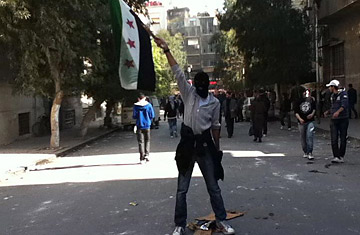
A Syrian protests against the country's President Bashar Assad in Damascus on Dec. 19, 2011
Syria agreed on Monday to allow observers into the country to monitor the government's implementation of a long-delayed Arab League plan to end nine months of bloodshed, but the main Syrian opposition group quickly dismissed the move as "trickery" and a ploy to buy time to continue the crackdown that has left at least 5,000 dead.
"We're surprised that the Arab League has given the regime opportunity after opportunity," Burhan Ghalioun, leader of the Syrian National Council (SNC) told a press conference in Tunisia. "We want the Arab League to take a stronger stance." Such a stance may include Arab military protection, said Ghalioun, who was speaking at the end of a weekend congress that brought many of the SNC's 260 members together for the first time since its formation was formally announced in Turkey on Oct. 2.
"We urge the Arab League and the United Nations to defend Syrians by establishing isolated and secure areas inside Syria," he said. "We need to use force — even in a limited way — or for Arab protection forces to respond."
Ghalioun's remarks appeared to mark a break with the SNC's long-standing rejection of foreign military intervention. Still, few countries, Arab or otherwise, have shown any willingness to put their boots on Syrian ground. "We're searching for those boots," joked Walid al-Bunni, a prominent Syrian human-rights activist and member of the SNC who has done several stints in President Bashar Assad's jails. Turkey would be expected to play an important role in the establishment of any safe zone, several SNC members said. "But the Turks need political cover," al-Bunni said, speaking after the press conference. "An Arab and international cover. A safe zone must happen. It's not a question of how. It's the single way to protect our people."
By most accounts, the SNC congress meeting achieved one of its main goals: to build its internal structure. Bureaus were created with specific tasks such as foreign relations, human rights and revolutionary support. There had been heated moments over the weekend when members reportedly almost came to blows over some of the details.
One of the meeting's other key goals was to present a vision of post-Assad Syria. As TIME reported on Sunday, the Syrian military will have a key role to play. "We differentiate between the state and the regime," Ghalioun said on Monday. "We want to preserve its institutions, including the military."
Radwan Ziadeh, a U.S.-based Syrian dissident and leading SNC member, acknowledged that the army chief of staff and other senior officers "are responsible for killing civilians" and have been named in a recent Human Rights Watch report listing commanders allegedly responsible for crimes against humanity. "We don't have other options," Ziadeh said. "We need an institution to save the country, not to go toward chaos." The opposition has reached out to senior military commanders, he said, who are willing and ready to defect, "but first they want a safe zone to protect themselves and their families."
Bassma Kodmani, a spokesperson for the SNC, defended the outreach strategy. "We have to offer reassuring messages to groups who are fearful," she said. "The military in particular, we know in large part the army is a victim of a repressive machine in which it has no choice but to either shoot or take the very high risk of defecting. Under those circumstances, we can only send messages that the culture of revenge will not guide the transitional period."
But such discussion means little until Assad is made to step down. Ghalioun said that the opposition had a three-pronged approach to making that happen: organized resistance to the regime's thugs, continued mass protest and deepening the regime's international isolation.
The SNC chief acknowledged the role of the Free Syrian Army (FSA), a group of military defectors who are engaging in armed struggle against Assad's security forces. The leaders of the two organizations met recently in a bid to present a united front, but there are differences in their approach to the Syrian uprising, differences Ghalioun tried to play down on Monday. There was no FSA representative at the Tunisia meeting, and the SNC has repeatedly stressed the need to maintain a peaceful uprising. "We said we'd do everything to prevent our country from moving to civil war between two armies, two sects, two areas," Ghalioun said. At the same time, he tried to characterize the FSA's actions as self-defense: "Yes, there is violence, but there is aggression and a response to aggression. You cannot equate that."
On the issue of Assad, Ghalioun said that there were "many countries, many sides" looking at providing possible exile for "this criminal." But Assad insists that his hands are clean and that his police state has been infiltrated by rampaging armed terrorist gangs, a view reiterated on Monday by his Foreign Minister Walid Moallem at a press conference in Damascus. "Many countries do not want to admit that there are armed terrorist gangs," Moallem said. "They will see them, they will see all of this," he said, referring to the observer mission.
The Arab League had given Damascus until Wednesday to agree to the proposal first mooted six weeks ago, or risk having the matter go to the U.N. and possible wider international intervention. The monitors will observe whether or not Syria abides by the undertakings it has accepted, under the protocol, to withdraw its tanks and troops from the streets, release political prisoners and start talks with the opposition. Moallem said the observers were "welcome in their second home, Syria" and that the deal was for a month, after which it could be renewed. Arab League Secretary-General Nabil al-Araby said that the mission would have a total of about 100 members.
